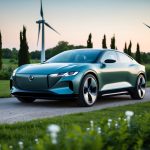With the advancements in automotive technology, 2024 presents consumers with a critical choice between hybrid and electric vehicles. Understanding the differences and benefits of each type can significantly impact both your wallet and environmental footprint. Whether prioritizing cost efficiency, fuel savings, or eco-friendliness, this guide will help you decide the best option for your needs.

Hybrid vehicles combine a traditional internal combustion engine with an electric motor, leading to improved fuel efficiency and reduced emissions. They are especially beneficial for those who drive long distances regularly and require the flexibility of using gasoline when electric power is insufficient.
Electric vehicles, on the other hand, rely solely on battery power, producing zero tailpipe emissions. These vehicles are not only better for the environment but also benefit from increasingly widespread charging infrastructure and lower long-term maintenance costs. They are ideal for those with shorter commutes or access to reliable charging stations.
The Evolution of Green Vehicles
The history and advancements of green vehicles have significantly transformed the automotive industry. Exploring the developments in both electric vehicles and hybrid technologies reveals the strides made toward sustainability.
History of Electric Vehicles
Electric vehicles (EVs) have a history dating back to the 19th century. The first practical electric cars were developed in the late 1800s by innovators like Thomas Parker. Initial models were popular due to their simplicity and low maintenance compared to internal combustion engines.
Early EVs enjoyed success in the early 20th century but were eventually overshadowed by gasoline cars. It wasn’t until the late 20th century, with increasing environmental awareness and advances in battery technology, that EVs saw a resurgence. The introduction of lithium-ion batteries in the 1990s significantly improved the range and efficiency of EVs.
Major milestones include the launch of the Toyota Prius, the world’s first mass-produced hybrid, and the Tesla Roadster, which demonstrated the viability of all-electric sports cars. Today’s EVs, like the Nissan Leaf and Tesla Model 3, offer impressive ranges and performance, driving the global shift towards electrification.
Advancements in Hybrid Technologies
Hybrid vehicles combine internal combustion engines with electric propulsion, aiming to enhance fuel efficiency and reduce emissions. The concept of hybridization gained momentum in the 1990s with the release of the Toyota Prius, which offered a new approach to eco-friendly driving.
Technological advancements have significantly increased hybrid efficiency. Modern hybrids use regenerative braking to recharge their batteries, cutting down on wasted energy. Plug-in hybrids (PHEVs) feature larger batteries, allowing for extended electric-only ranges before the gasoline engine kicks in.
Innovations in battery technology and power management systems contribute to hybrids’ growing popularity. Brands like Honda and Ford have expanded their hybrid offerings, showcasing a commitment to sustainability. Hybrid technologies have bridged the gap between traditional combustion engines and fully electric vehicles, offering a versatile solution for reducing carbon footprints.



